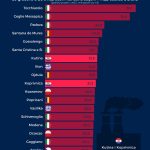At the end of the first quarter of this year public debt amounted to 38.44 billion Euro, or 626 million Euro less than at the same time last year
Data released by the Croatian National Bank and analysed by the Croatian Chamber of Commerce (HGK) show public debt smaller by 1.6%, with the HGK attributing it to the continuation of positive budget activities, Tportal.hr reported on July 3, 2016.
“In the first quarter of this year at the level of the consolidated central state a budget deficit of 2.6 billion Kuna was recorded, two times less than the same time less year, which led to a reduced need for financing,” the analysis stated.
Favourable budget and public debt activity are partly a result of the fact that in the first quarter of this year only temporary and limited financing was available in terms of new financing.
“However, the reduction of the share of public debt in the GDP from 86.7% to 85.8% shows that, with additional effort in activating or selling parts of state property, by the end of the year the activity of the state debt could be stabilised,” HGK noted.
Compared to February, in March the public debt was reduced by 1.3 billion Kuna, despite the issue of a domestic state bond amounting to four billion Kuna with a ten year due date and 3.99 percent interest.
“That bond affected the increase of domestic state debt by 2.6 billion Kuna, but at the same time in March the level of foreign debt was reduced by 3.9 billion Kuna,” HGK analysts explained.
They also noted that temporary budget financing followed by the technical government period reduced the intensity of creating new commitments in the short term, resulting in a more favourable dynamic of public debt.
“However, in reality, political instability is threatening the continuation of favourable tendencies in public debt as the deceleration of structural reforms and limits on the improvement of the state’s credit rating keeps financing costs high, making it more difficult and risky to service future duties,” HGK warns.
Due to such circumstances, the option to restructure commitments in a period of historically low interest rates on the world market is limited. HGK analysts also warn that the technical government period makes it harder to complete the planned activation of state assets, affecting the public debt, while at the same time there is a lack of progress in defining a more effective strategy in managing public debt.







